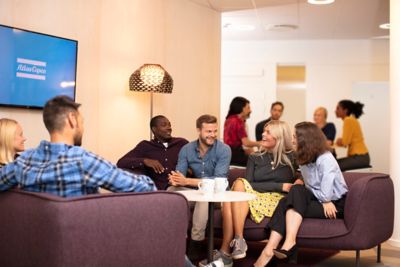Contributions make a difference for water access at school in remote Uganda
In a world where 1 in 9 people still doesn't have access to clean water, the smallest change makes a big difference. Contributions to Water for All made by our UK employees mean the world for children of the Buguluube village school in remote Uganda. Read what the funds raised by Mike Pritchard were used for and how they influence the children's lives.
Back in October one of our employees, Michael Pritchard, went to Uganda to see all of the work that Atlas Copco has funded over the past two years for the Buguluube village programme. Before the trip, he was able to raise more than £700 through activities such as cake sales, selling raffle tickets and a dress-down day in the office. These donations from Atlas Copco UK will soon provide Elly Memorial Primary School with 7 Bio Sand filters so the childrenchildren gain access to clean drinking water, without the need to constantly boil rain harvested water, which is time consuming, and can take them away from studies.
My take away from the trip was a general feeling of happiness and community spirit, where the people are truly appreciative of the work done for them. Everywhere we went, we met warm, generous, humble, intelligent, generally happy people with infectious smiles. It was hard not to be overcome with emotion at some of the difficult situations we witnessed, but it was impossible not to smile and laugh with the people we met along the way!
Why bio-sand filters?
The Elly Memorial Primary school looks after more than 350 souls. When the dry season comes around, the water tanks at the school can no longer collect and provide the pupils with clean drinking water. This means they may have to resort to drinking water from an unsafe source, which leaves them vulnerable to illness and missing days of school.
The main implement available for improving the quality of the water from the source is boiling, for which they use firewood. This is damaging for the environment, however, because it means the villagers must cut down trees in order to be able to boil the water they need day-to-day. The better alternative found by Just a Drop Foundation was to use bio sand filters instead, which are a simple and straightforward solution made locally.
How does a bio-sand filter work?
A bio-sand filter begins its life as a plastic bucket. The transformation of the bucket takes place by adding a fixed limtus paper, small stones of different sizes and sand. Water from the harvested water source is poured into the clean bucket, which is then sieved through the stones, sand and limtus paper, becoming safe for drinking.
What's the bottom line for the people?
For a start, water-borne disease is reduced among school children. This, in turn, means that they can spend more productive time at school instead of being sick at home. The raised numbers of school attendance means that the time in school furthers their education and improves their lives in the future. Being educated, they also have a higher awareness and appreciation of drinking safe water, which is passed to their family and improves the community as a whole.
In his trip to see the impact of the Water for All funds, Mike noticed that without the access to clean water, hundreds of people are stuck in a circle of poverty. Several times a day, they make a long trek to the only source of water available to collect water for their families, which is often stagnant. This water is then taken home, and filtered through cloth to remove the large particles, before being boiled ahead of drinking.
The rudimentary purification is insufficient, causing disease. This leads to the need for increased health care, in localised systems that sometimes only benefit from visiting GPs, that the people can ill afford to fund. That then leads to a lack of money for living essentials like food and clean water, which means they go back to back to the unsafe water source. And the so the story of misery continues.
Why schools and not somewhere else?
It’s clear to see that education in the schools, in parallel to providing access to clean water, is the key to long term gains in the communities. If the children understand the need for good hygiene, sanitation and only drinking clean water, along with the importance of spreading this message at home, then positive change will come.
I want to help. What can I do?
If you're an Atlas Copco employee, you can make a big difference by donating through payroll. For every £1 that you donate, Atlas Copco matches it with £2. So get in touch with HR and ask for a Water for All donation form to get you started. It takes less than 2 minutes to fill in and the HR team takes care of the rest for you.
Not an Atlas Copco employee? No problem. Visit the Water for All site and donate directly to our parent organisation.
